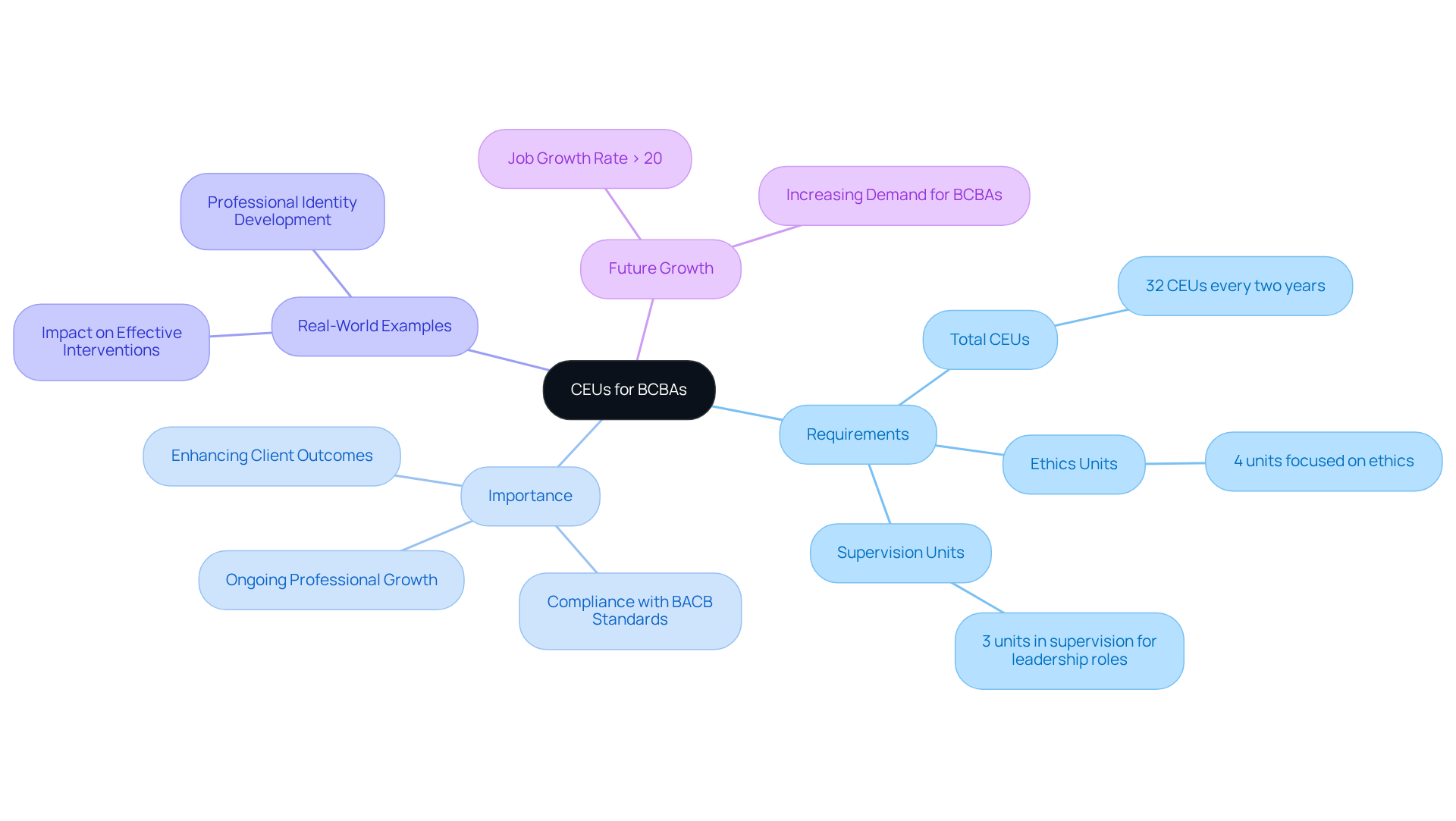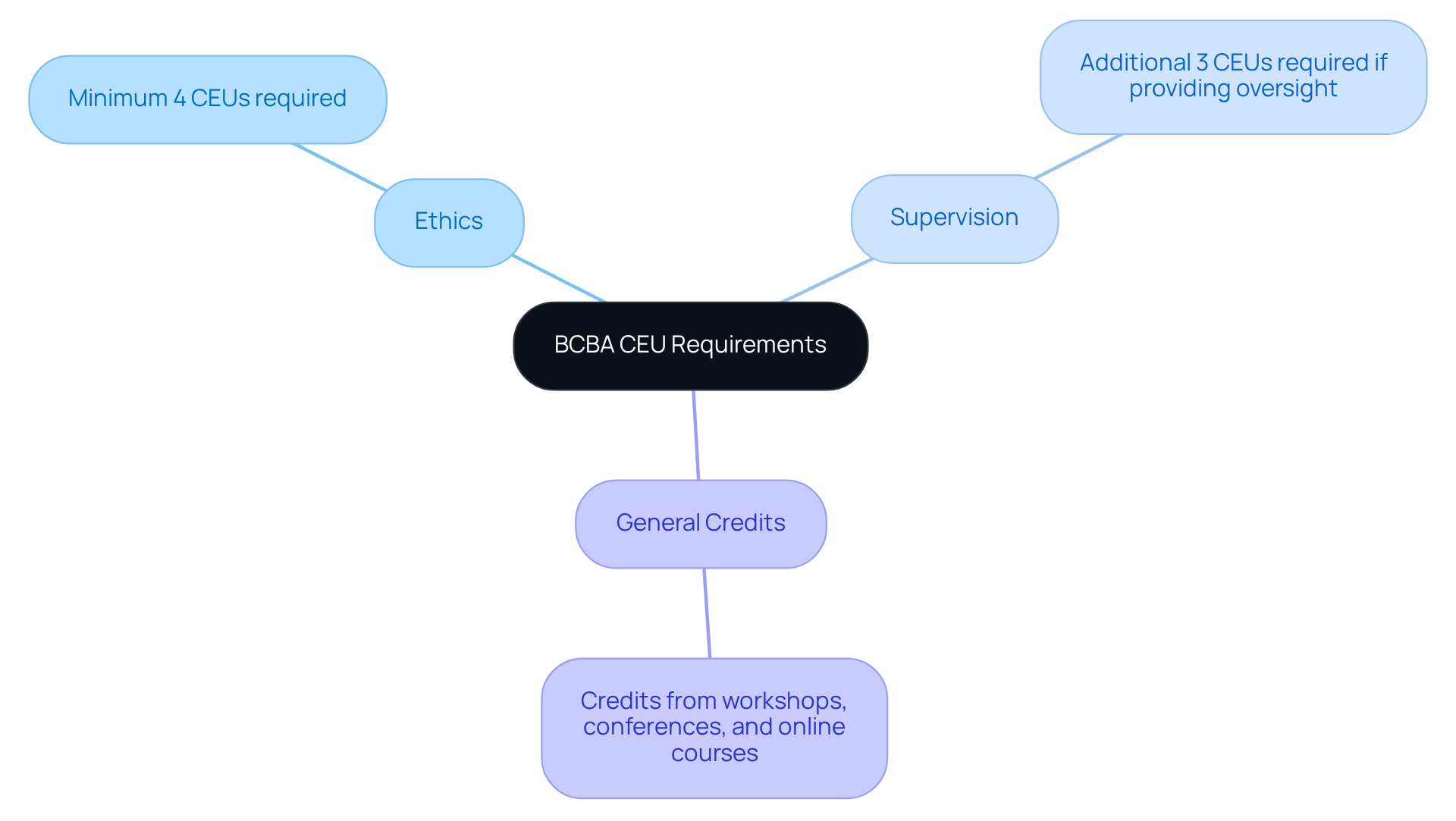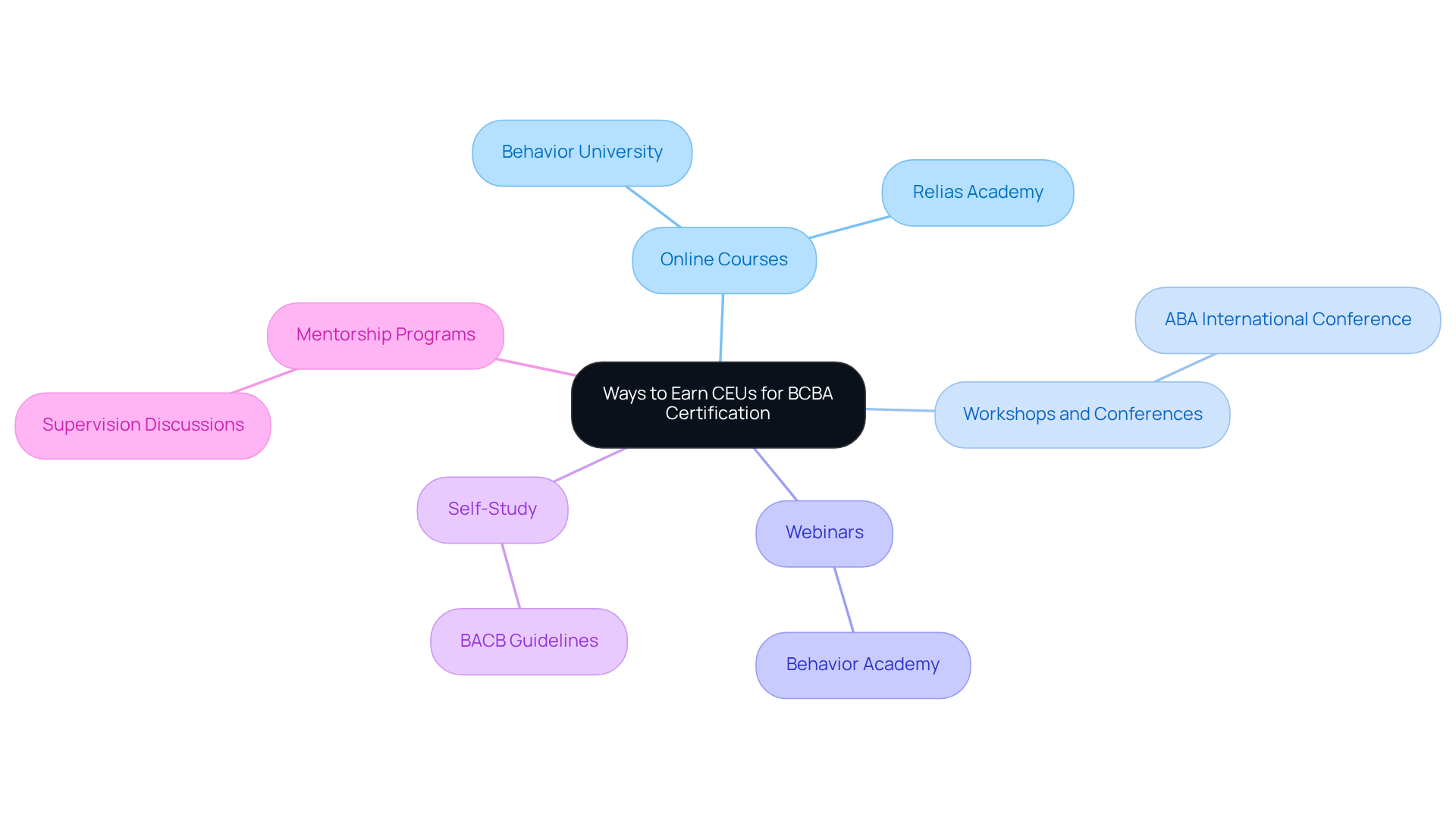September 18, 2025

The essential guide to BCBA certification highlights a critical requirement: professionals must complete 32 Continuing Education Units (CEUs) every two years. This includes specific units concentrated on ethics and supervision.
Why are these CEUs so vital? They are not only essential for compliance with certification standards but also play a significant role in enhancing professional knowledge and effectiveness in delivering behavioral interventions.
By prioritizing these educational opportunities, BCBAs can ensure they remain at the forefront of their field, equipped to meet the evolving demands of their profession.
Understanding the requirements for Continuing Education Units (CEUs) is crucial for Board Certified Behavior Analysts (BCBAs) as they navigate their professional journey.
With the impending changes in 2025 mandating 32 CEUs every two years, including specific focuses on ethics and supervision, the stakes are higher than ever for practitioners committed to excellence in Applied Behavior Analysis (ABA).
As the demand for BCBAs continues to soar, how can professionals effectively meet these evolving requirements while ensuring their skills remain sharp and relevant?
This guide delves into the essential CEU landscape, offering insights on compliance, professional growth, and the myriad ways to earn these critical units.
Board Certified Behavior Analysts (BCBAs) need to know [how many CEUs for BCBA](https://hireaba.today/how-we-work) are vital to uphold their certification and advance their career development. These units signify participation in educational activities that keep practitioners abreast of the latest research, ethical standards, and best practices in Applied Behavior Analysis (ABA). Starting in 2025, BCBAs will need to know how many CEUs for BCBA they are required to complete, which is 32 CEUs every two years, including at least 4 units focused on ethics and 3 units in supervision for individuals in leadership roles. This structured approach not only ensures but also fosters ongoing professional growth.
Real-world examples underscore the importance of CEUs in the careers of BCBAs. For instance, many professionals report that engaging in CEU activities has directly enhanced their ability to implement effective interventions and improve client outcomes. One BCBA remarked, "The path to becoming a BCBA is not just about meeting requirements; it’s about shaping your professional identity and making a meaningful difference in the lives of those you serve."
Moreover, behavior analysts work with clients facing developmental disabilities, mental health challenges, and those in educational settings, where behavioral interventions can significantly impact learning outcomes. The demand for BCBAs is anticipated to rise considerably, with job growth rates expected to surpass 20% over the next eight years. This highlights the necessity of remaining current in the field. By prioritizing how many CEUs for BCBA, behavior analysts not only fulfill regulatory obligations but also enhance their knowledge, ensuring they remain competitive and effective in their roles.

To maintain BCBA certification, professionals must understand how many are required, which is 32 Continuing Education Units (CEUs) within a two-year cycle. This is not just a formality; it is essential for ensuring that BCBAs remain knowledgeable and effective in their roles. The requirements are as follows:
To determine how many CEUs for BCBA you need, check your credentialing date and compute the necessary units before your upcoming renewal. Regularly consult resources like the BACB website and the BCBA Handbook to stay updated on any changes in requirements. Statistics indicate that failure to respond to the BACB by the specified deadline results in automatic suspension of credentials or application eligibility. By actively overseeing your continuing education units, you ensure ongoing career growth and compliance with the ethical guidelines established by the BACB.

In today’s fast-evolving landscape of Applied Behavior Analysis, understanding how many CEUs for BCBA certification is essential. With projected to exceed 20% in the next eight years, the demand for qualified professionals is on the rise. To meet certification requirements and enhance professional development, BCBAs can utilize a variety of effective methods:
By diversifying the methods to earn CEUs, BCBAs can effectively answer the question of how many CEUs for BCBA while simultaneously enriching their knowledge and skills in Applied Behavior Analysis. Moreover, maintaining detailed records of CE activities is crucial for compliance with BACB guidelines. Embrace these opportunities to advance your career and ensure you remain at the forefront of the profession.

Understanding the CEU requirements for BCBA certification is crucial for professionals in the field of Applied Behavior Analysis. With job growth for BCBAs projected to exceed 20% in the coming years, completing 32 CEUs every two years—including specific units focused on ethics and supervision—is essential. This structured approach not only fulfills regulatory obligations but also supports the ongoing professional growth of behavior analysts, ensuring they remain informed about the latest developments in their practice.
Key points highlighted throughout this article underscore the importance of CEUs in enhancing intervention effectiveness and improving client outcomes. Real-world examples illustrate how engaging in CEU activities can shape a BCBA's professional identity, empowering them to make a meaningful impact in their clients' lives. Therefore, staying current through continuing education is not just beneficial but essential for career advancement.
In light of these insights, it is imperative for BCBAs to actively seek out opportunities to earn CEUs through various means, such as:
By prioritizing their continuing education, behavior analysts can ensure compliance with BACB guidelines while enriching their knowledge and skills. Embracing these educational opportunities will enhance professional development and contribute to the overall effectiveness of the field, ultimately benefiting the clients they serve. Are you ready to take the next step in your professional journey?
What are CEUs and why are they important for BCBAs?
Continuing Education Units (CEUs) signify participation in educational activities for Board Certified Behavior Analysts (BCBAs) to stay updated on the latest research, ethical standards, and best practices in Applied Behavior Analysis (ABA). They are essential for maintaining certification and advancing career development.
How many CEUs are required for BCBAs starting in 2025?
Starting in 2025, BCBAs will be required to complete 32 CEUs every two years, which must include at least 4 units focused on ethics and 3 units in supervision for individuals in leadership roles.
What is the significance of completing CEUs for BCBAs?
Completing CEUs ensures compliance with the Behavior Analyst Certification Board (BACB) standards and fosters ongoing professional growth, enhancing BCBAs' ability to implement effective interventions and improve client outcomes.
How do CEUs impact the professional identity of BCBAs?
Engaging in CEU activities helps BCBAs shape their professional identity and make a meaningful difference in the lives of those they serve, beyond merely meeting certification requirements.
What types of clients do BCBAs work with?
BCBAs work with clients facing developmental disabilities, mental health challenges, and those in educational settings, where behavioral interventions can significantly impact learning outcomes.
What is the expected job growth rate for BCBAs in the coming years?
The demand for BCBAs is anticipated to rise considerably, with job growth rates expected to surpass 20% over the next eight years.
How do CEUs help BCBAs remain competitive in their field?
By prioritizing CEUs, behavior analysts fulfill regulatory obligations and enhance their knowledge, ensuring they remain competitive and effective in their roles.
Our expert recruitment strategies and AI-driven sourcing ensure that you receive top-notch candidates quickly, without compromising on quality. Whether you’re looking for BCBAs, Clinical Directors, or RBTs, we’ve got you covered.